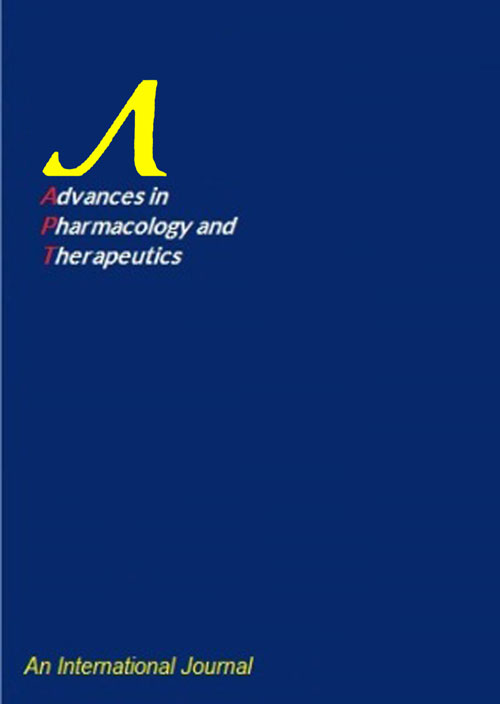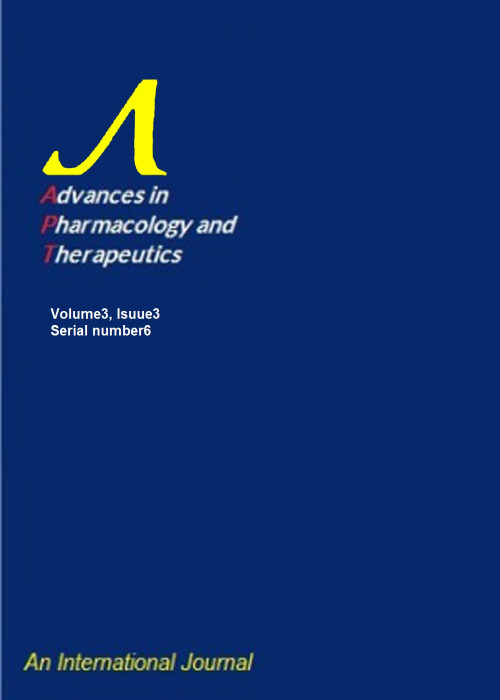فهرست مطالب

Advances in Pharmacology and Therapeutics Journal
Volume:2 Issue: 1, Summer 2022
- تاریخ انتشار: 1401/06/30
- تعداد عناوین: 8
-
Pages 1-3
Dear Editor,Alzheimer's disease (AD) is a common frustrating disease among older adults. It imposes a high economic and medical burden on society and families. Although Alzheimer's disease is a progressively disabling psychiatric-neurological disorder, and there is no effective drug stopping or delaying the disease process over the last decade, lots of research has been done on some antibodies against amyloid plaques, which are the main etiology of this disease (1). By June 2021, Aducanumab (Aduhelm®) was approved by the Food and Drug Administration (FDA); it was demonstrated that this drug could be an effective intervention to prevent and remove the formation of amyloid plaques (2). Because of the lack of extensive research on this drug, many physicians and patients are concerned about its efficacy and side effects. However, many Alzheimer's specialists are satisfied with the approval of this drug.
Keywords: Alzheimer’s Disease, Aducanumab, Amyloid-β -
Pages 4-7
Health concerns, changes in lifestyle, job losses, economic hardships, and the death of family members during the Covid-19 pandemic have led to depressive disorders. Here, a 39-year-old man referred to a psychiatric clinic with the complication of depressed mood, which was exacerbated by stress, anxiety, restlessness, and insomnia. In addition, he was referred to a cardiologist and dermatologist because of uncontrolled tachycardia and urticaria. After detailed examination, the final diagnosis was COVID-19, along with anxiety disorder and dermatological diseases.Since the Coronavirus disease (COVID-19) can cause stress and psychological problems, it can disrupt the patient's healing process if ignored. On the other hand, there seems to be a strong association between psychiatric illnesses with COVID-19 and urticaria that can be investigated.
Keywords: COVID-19, depression, Psychiatric Disorder Urticaria -
Pages 8-10
A 31-year-old married woman from the southeastern region of Iran, residing in the center of Iran, with generalized skin lesions, mostly on her hands, was referred to a psychiatrist. Painful rash that spreads and blisters resembling bleeding, watery, progressive, severe itching, and dermis were isolated from the epidermis. After obtaining a history, it was noticed that the skin lesions did not appear after contact with any allergens or detergents. In addition, there was a cause-and-effect relationship with the use of Lamotrigine, which was exacerbated by starting and increasing the drug dose. The lesions were reduced or disappeared by decreasing the dose of the drug. No other underlying disease was found. Initially, she was referred to an experiential therapist for specific behavioral conditions and received advice such as prayer, spells, and exorcism, which were ineffective. She described things like hearing a voice and sudden crying, seeing small people, and becoming confused and aggressive. She suffered from sleepwalking, functional neurological symptom disorder (FNSD), visual and auditory hallucinations, and aura. An electroencephalogram (EEG) showed a temporal lobe arrhythmia. Based on EEG and her symptoms, temporal lobe epilepsy was diagnosed. Olanzapine was prescribed because the patient had lost appetite and subsequently lost weight due to depression and behavioral problems.
Keywords: Temporal Lobe Epilepsy, Lamotrigine, Stevens-Johnson Syndrome -
Pages 11-13
in this study it was introduced a 34-year-old married man from a small city in the Southeastern area of Iran who was referred to a psychiatrist because of the restriction of the range of his jaw motion.The patient could not open his mouth within the normal range (35 to 55 mm; 3-finger wide). He felt intolerable pain and had talking problems, eating, swallowing, and was highly emotional. Three finger test was positive. He had a history of using opium (1 mg per day) and clonazepam (1 mg every night) from 10 years ago. He had a history of sudden drug withdrawal and has replaced the opium with 20 mg of methadone tablet. He had no personal or family history of other illnesses. In his neurological checkup, a painful condition restricted optimal mandibular movement caused by masticating muscle spasms.
Keywords: Benzodiazepine, Trismus, Letter to the Editor -
Pages 14-18
The role of the gut microbiome in influencing immune function and homeostasis is being investigated. A 56-years-old female patient was referred due to nightmares, insomnia, pain, and redness in all her fingers. At first, Zolpidem was prescribed by a psychiatrist, but it induced a stuffy nose, change in behavior, drugged feeling, and tiredness. Previously she had been referred to a rheumatologist, and after some visits, atypical scleroderma had been diagnosed. She received psychiatric treatment with quetiapine and melatonin and was prescribed a probiotic diet. The patient was followed up and showed an excellent therapeutic response after augmentation with diet therapy. The treatment based on gut or fecal microbiome transplantation (FMT) may affect the patient's behavior and sleep disturbance. Thus the key point is the role of gut microbiota and FMT-based therapy in chronic rheumatic patients with resistance and refractory psychiatric symptoms, which improves the quality of life and acceptance of treatment.
Keywords: Systemic sclerosis, Gastrointestinal involvement, Gut microbiome, Immune system -
Pages 19-28Introduction
Levetiracetam, an anti-epileptic drug, is usually used as an adjunctive treatment of partial-onset seizures with or without secondary generalization. In this article, various neuropsychiatric effects of Levetiracetam are investigated.
MethodsThe following databases were searched: PUBMED, Google Scholar, MEDLINE, Embase, ProQuest, and Science Direct. The articles searched in the mentioned databases were from 2003 to 2021. Ninety-nine articles were selected, fifteen articles such as case reports and letters to the editor were removed due to low scientific credibility, and eighty-four articles were selected. Due to the small number of articles, articles in the form of case reports and letters to the editor were also used to write about mania.
ResultsCase reports showed that some cases of behavioral disorders, aggression, and depression had been observed following the use of Levetiracetam. In this study, various evidence were collected to determine the performance of Levetiracetam and to what extent it can have important and vital side effects. This drug can strengthen suicidal thoughts and aggression in consuming patients, especially the patients with other underlying diseases.
ConclusionAccording to the side effects mentioned for Levetiracetam, it is suggested that psychiatrists and neurologists pay more attention to these side effects when prescribing.
Keywords: Levetiracetam, anxiety, Cognition Disorders, depression, Problem Behavior, Psychiatry, Suicide -
Pages 29-38
The prevalence of Coronavirus disease (COVID-19) has been associated with many psychological problems and concerns. This study aimed to evaluate the effectiveness of virtual acceptance and commitment group therapy on mental health in women undergoing Covid-19 treatment. This study was a randomized controlled trial and a quasi-experimental with a pre-test and post-test design. The statistical population included women undergoing Covid-19 treatment living in Ardakan, Yazd, Iran. Eighteen participants were randomly and equally divided into two groups of 9 cases, including the experimental and control groups. The participants answered the Lovibond Psychological Questionnaire (1995) in the pre-test and post-test stages. The experimental group received virtual-based acceptance and commitment group therapy intervention in 8 one-hour sessions, two sessions per week.In contrast, the control group did not receive any intervention during the study. Finally, the data were analyzed by the covariance analysis method at the significance level of 0.05. The results showed that the mean score of mental health and its dimensions (depression, anxiety, and stress) in the experimental group compared to the control group decreased significantly in the post-test stage (P<0.001). According to the research results, virtual acceptance and commitment to group therapy can effectively reduce the psychological problems of people suffering from COVID-19.
Keywords: COVID-19, Mental health, Acceptance, Commitment, Group therapy, depression, anxiety, stress -
Pages 39-44
About 10-25% of people worldwide suffer from allergic rhinitis. Due to reduced quality of life and work and educational productivity caused by allergic rhinitis, billions of dollars are spent annually due to minimized production. Although effective symptomatic treatments for this disease are available in conventional medicine, about 30% of patients use complementary medicine for their treatment to avoid the side effects of medications.The present study reported a 40-year-old woman with a warm mizaj, referred to a health center of Rafsanjan University of Medical Sciences. Her main complaints were secondary nasal congestion and chronic allergic rhinitis. Her history showed symptoms of participatory gastric involvement and mild postnasal discharge. She also had a lot of imaging done for the polyp. The tests showed that she was prediabetic and controlled by walking. After completing the total nasal symptom score (TNSS) questionnaire and other questionnaires to determine the mizaj and demographic characteristics in the first treatment session, considering her symptoms and participatory gastric involvement, a possible diagnosis of nazleh was proposed. Therefore, she was prescribed to change her lifestyle by some measures, avoid certain foods in her diet and eat one tablespoon of pomegranate paste daily after each meal. The TNSS questionnaire was completed, and the results obtained in the first month were compared with the results obtained in the second month. Finally, after two months of intervention, the score obtained from the questionnaire decreased significantly.The use of Persian Medicine such as pomegranate paste and Persian Medicine actions were helpful in this case, significantly improving allergic rhinitis symptoms.
Keywords: Allergic rhinitis, Persian medicine, Pomegranate paste


